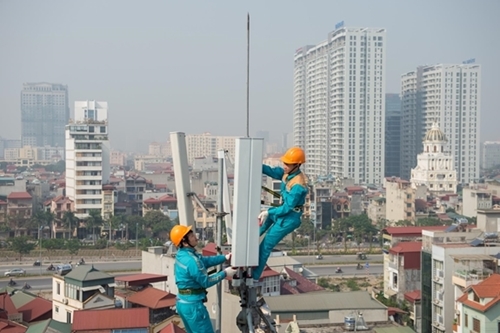In preparation for its upcoming 10th Party Congress, Viettel’s leadership and staff are now mapping out a roadmap for the group’s development in both short and long term.
Strategic vision
Five years ago, Viettel had various advantages when preparing for its ninth Party Congress of the 2015-20 term. It had successfully finished the plan and all objectives set by the eighth Party Congress a year earlier (in 2014). With its big successes in both business and production, Viettel maintained its position as the country’s largest telecom and a leading State-run economic group.
    |
 |
|
Viettel will strive to become a leading telecom on not only domestic market but also regional and global markets. (Photo for illustration) |
But the very successes of the eighth term were challenges for the leadership of the nineth term. At a conference to roll out the 2015 Resolution of the Viettel Party organization, leaders of the group underscored that the key to future success was to forget the current achievements. Viettel should look toward a new horizon and create new business and production opportunities by expanding the concept of telecommunication. Accordingly, the group should not only provide connection services, but also participate in other fields with the aim of making life more convenient and more comfortable. It should not only be only a telecommunication services provider but also a provider of digital services, network security services and a producer of telecommunication equipment, electronic devices, and hi-tech defense equipment.
In 2015, the Viettel Party organization held its 10th Congress with the participation of 200 delegates, who were the most competent officers and workers from its agencies and affiliated companies. The main theme of the congress was “To improve leadership capacity, successfully implement strategic moves, build the group as a global telecom.”
The congress issued a five-year (2015-20) development strategy for the group, according to which Viettel aimed to become a hi-tech group serving both economy and military. Viettel also strived to be a global group operating under the international standards and rules. On one hand, Viettel continued improving the quality and efficiency of its traditional production and business in the telecommunication industry; on the other hand, Viettel also invested in network security and information security, as well as focused on providing digital services and information technology applications.
The group also conducted a big reshuffle in its organization and personnel in line with its new development phase (the fourth phase). In 2016, it retrained and moved a large number of engineers and workers working in the telecommunication industry into new industries, such as electronic trade and logistics. It also established several new affiliated companies, which were expected to play key roles in its fourth development phase. They include Viettel Business Solution Corporation, Viettel Network Security Company, Viettel Hi-Tech Industry Corporation, and Viettel Digital Services Corporation.
The big and bold move of the group has brought about successes in its business and production over the past five years. Viettel earned VND 251 trillion of gross revenue in 2019, up by 7.5 percent year on year.
No resting on their laurels
Viettel has the tradition “Victory lasts only one second.” Engineers and workers at Viettel do allow themselves to enjoy their victories for just a short moment. For them success has no limits. As they all want to aim high and dare to encounter big challenges, they would embark on another project right after a success.
Although Viettel keeps reaping big fruits in telecommunications, its leadership is thinking of changing the group’s organization and business models. In its draft political report prepared for the Party Congress of Viettel, its Party Committee points out that the 2020-25 period will see a boom of digital transformation so the group should transform from a telecommunication services provider to a digital services provider. The ratio of its revenue from digital services and hi-tech products should increase steadily in the coming years. To achieve the goal, Viettel has planned to provide digital financial services, produce digital contents, invest in and lease digital infrastructures and cloud computing. Additionally, it will actively participate in an e-government project as well as the building of a digital economy and digital society. Finally, the group will also invest in building a hi-tech defense industrial complex.
Parallel with its investment in digital transformation and hi-tech products, Viettel continues to invest in its telecommunication network with the aim of creating a super-broadband cable network facilitating the development of 5G and IoT. As it has defined in its plan for the next five years and its vision beyond 2025, Viettel will strive to become a leading telecom on not only domestic market but also regional and global markets.
Along with consolidating the domestic market, Viettel continues investing in foreign markets. It will upgrade its telecommunication networks in its already-invested markets as well as seek to invest in new foreign markets. It will also research, develop and apply more AI technology in its telecommunication services so as to contribute positively to socio-economic development in its invested countries.
Viettel has drawn six major lessons from its task performance in the period 2015-20: 1. All production and business activities of the group must be put under the direct leadership of its Party Committee and Directorate. 2. Leaders of each affiliated unit should set examples for their subordinates and invest sufficiently in human resource development. 3. There should be good plans and strategic visions for business and production while making good assessments of markets and market trends. 4. It should always renovate itself and its business and production models as well as take the lead in researching, developing and applying new technologies. 5. Decisions should be based on analyses of big data. 6. Leaders at all levels should have good policies to encourage engineers and workers to make innovations at work.
Translated by Thu Nguyen